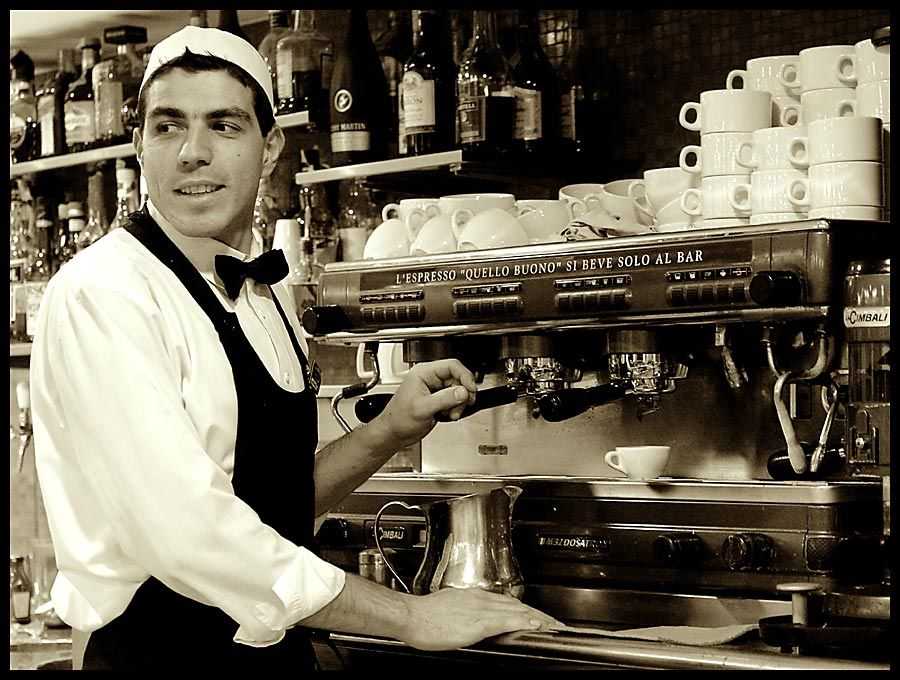MILAN — A third wave, that of specialty coffee and slow tasting, is sweeping through Italy, or rather is lapping against it like a Mediterranean tide: slowly but surely. And crucial to all of this is the barista, who from simple “cup filler” and football results commentator, is turning into an all-round professional, opening customers up to the wonderful world of quality coffee.
“For some time now we have been insisting on quality. It’s taking a while for specialty coffee to catch on in Italy, and it accounts for just 5% of our turnover, but once you do get hooked on quality coffee there’s no turning back,” says Paolo Uberti, owner of Trismoka. “And I don’t just mean SCA-certified coffee.
There are lots of excellent non-certified coffees that are made in some remarkable places. The market looks set to keep on growing. If you have a well-roasted product, a good barista and a convincing marketing operation, then people are willing to spend a few cents more for their coffee.”
An evolving world?
“Everything has changed, even compared to just five years ago. Now, when we offer high-end coffee they listen to us. We might end up disagreeing over the higher costs, but interest has certainly grown.”
How is Italian coffee perceived in the world today?
“Some markets snub us, not surprisingly, because some firms did use to sell sub-standard products. Others welcome Italian-made products, but it’s up to us to supply quality blends tailored to local needs instead of chasing the lowest possible price. Bars will increasingly go on doing all they can to stand apart from the rest, and any that make bad coffee will be pushed out.”
What about other channels?
“Even the best restaurants tend to relegate coffee to the sidelines, but it is the thing that is rounding off the meal before you get the bill, and you neglect it at your peril. Pastry shops and bread shops are among our more quality-conscious clients, possibly because theirs is a world of aromas and sensations, and that’s exactly what we are all about.”
The sensation of a growing demand for quality is confirmed by Silvia Ruggiero, brand manager of Gruppo Cimbali, a world-level manufacturer born of the union between two historic brands, LaCimbali and FAEMA.
“The Italian public is increasingly trying to keep up with new trends in coffee drinking. In Milan we are looking forward to the opening of Starbucks with the Roastery, a coffee shop concept that does not yet exist in Italy, and an important moment we all need to be ready for. We think that extraction methods other than espresso are complementary to traditional coffee drinking, they serve to stimulate consumers, giving them the opportunity to drink quality coffee with a wider range of products on offer. In addition, they help to create a different relationship with the barista, who becomes a consultant, explains the difference between the different types of coffee and gives advice. You can take a less rushed approach to drinking coffee, stopping, tasting, getting used to different flavours and discovering you are more in tune with one type of coffee than another.”
So with this in mind, what new coffee-making machinery is appearing?
“At Host we previewed a new version of a traditional machine that retains all the technical features of a machine for specialist baristas, but also has a highly intuitive button panel. Baristas will be able to customise the machine to suit their needs and personalise their ‘recipes’: the interaction is simpler and helps them work in a smarter way. Then we have developed and presented another traditional machine which, as well as preparing hot milk, can also work automatically with cold milk to extend the range of products the bar serves. On the one hand we are paying attention to specialised baristas who want a flexible machine, and on the other we are working on those cafés that demand a high level of automation to ensure a constant level of quality.”
What about the Internet of Things?
“Chains can remotely control the performance of their machines, deal with any malfunctioning and cater to the kind of beverage customers are looking for, so the products the outlet offers is tailored to demand. The remote display can also be personalised, loading the promotion of the week, for example, and achieving a higher level of communicative consistency.”
The Cimbali group exports 80% of its output.
What about sales in Italy?
“The high-end machines are doing really well. It is a mature market, but baristas who achieve a certain level of manual dexterity expect an even higher performance level of the machinery they use. I think that the trend towards offering different types of coffee means paying closer attention to customer demands, so we have to keep going and so do baristas, it’s a continual team effort.”


















